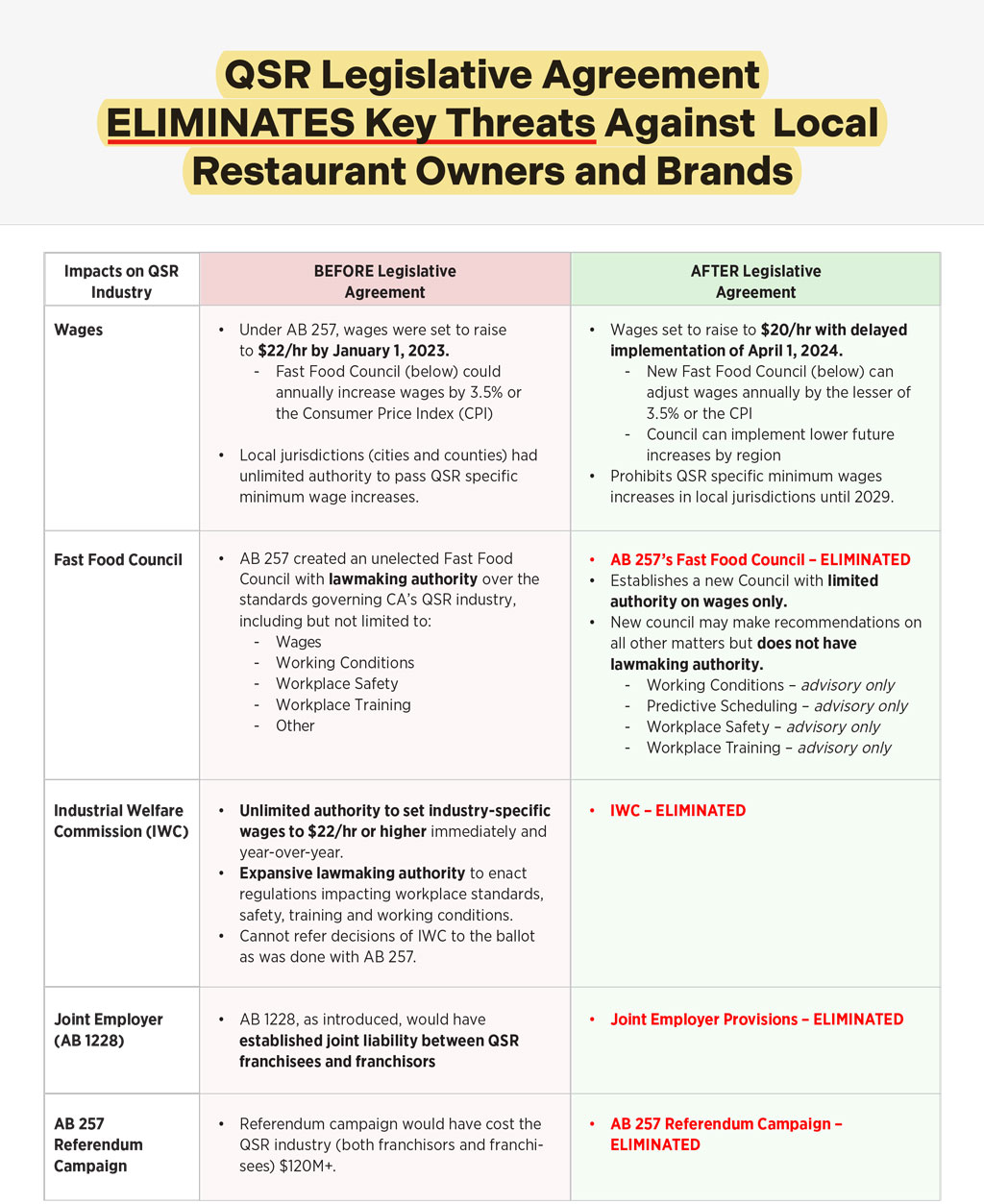IFA & California Franchisees Issue Statement on Deal To Protect Restaurants

The IFA released the following statement on passage of AB 1228 by the California State Legislature, after it was amended following the announcement of a legislative agreement brokered by California Governor Gavin Newsom, the Save Local Restaurants coalition, and the Service Employees International Union (SEIU).
The agreement will protect California restaurants from the harms of AB 257 (FAST Act), joint liability on quick-service restaurants imposed by the original version of AB 1228, and regulatory overreach by the Industrial Welfare Commission.
“This agreement creates the best possible outcome for workers, local restaurant owners, and brands, while protecting the franchise business model in California,” said IFA President and CEO Matt Haller. “Franchising is responsible for creating opportunities for thousands of people to become small-business owners, and this agreement eliminates the existential threats our members faced. We thank Governor Newsom for helping the parties come together and urge him to sign AB 1228.”
The IFA has been at the forefront of the fight against AB 257, spearheading the Save Local Restaurants coalition following its passage to take the measure to voters through a referendum on the 2024 ballot. The bill would have created an unelected wage and labor council with lawmaking authority for California’s QSR industry, raising prices by an estimated 20% at affected restaurants, and forcing some restaurant owners to close their doors.
Following qualification for the referendum, lawmakers introduced AB 1228 in the 2023 legislative session, which, in its original form, would have imposed joint employment on franchised quick-service restaurants, a provision originally amended out of AB 257 because of its extreme nature. This bill would have fundamentally upended the franchise model in the state, forced corporate control over local restaurants, taken away business ownership opportunities, and significantly increased costs and litigation.
The IFA also spoke out against efforts in June to revive the California Industrial Welfare Commission through the budget process, as another attempt to undermine California voters by giving a separate, unelected board broad authority to set wages and working conditions for certain industries.
Franchisees from across the state weighed in on the agreement.
“This agreement is the best alternative for franchisees,” said Alex Johnson, a local franchised restaurant owner from Milpitas. “It protects the franchise model and our restaurants while giving meaningful wage increases to workers on a predictable timeline. It eliminates threats and regulatory burdens that would have hampered our ability to run our restaurants as independent small-business owners.”
“This agreement protects our rights as small-business owners and eliminates the unchecked councils that would have had sweeping powers to impose burdensome and costly regulations making it exceedingly difficult—if not impossible—to keep our doors open,” said Michaela Mendelsohn, a local franchised restaurant owner from Agoura Hills. “The sudden minimum wage increase to $20 an hour will add to the cost of operating a restaurant at a time when margins are already stressed, though this agreement puts a stop to the repeated attacks on local restaurant owners like me.”
“This agreement preserves the independence of franchisees and eliminates significantly higher costs and regulatory challenges for local franchise owners in California,” said Jerry Akers, a multi-brand franchisee and chair of the IFA’s Franchisee Forum. “The interests of franchisees were well-represented in the final agreement. As franchisees, we must continue to step up our advocacy to ensure the governor and legislature address burdens to growing businesses in California by reforming PAGA when the legislature returns.”
{Editor: California’s Labor Code Private Attorneys General Act (PAGA) authorizes aggrieved employees to file lawsuits to recover civil penalties on behalf of themselves, other employees, and the State of California for Labor Code violations.}
Last week’s agreement eliminates key threats to local restaurant owners by achieving the following:
1) Eliminates AB 257, which would have transferred authority over wages and workplace rules at local restaurants to unelected bureaucrats, most of whom would have had no relevant industry experience.
2) Eliminates the threat of joint franchisor-franchisee liability within AB 1228, which would have destroyed the franchise model in California and stripped thousands of restaurant owners of their right to run their businesses.
3) Unwinds the reconstitution of the Industrial Welfare Commission (IWC), which, similar to AB 257, would have had sweeping powers to implement immediate and unchecked decisions on wages and workplace requirements for local restaurants.
4) Creates a clearer, predictable wage schedule through 2029. The California Legislature will introduce a new starting wage of $20 per hour of work for all limited-service restaurant workers who are part of a chain with 60 or more locations, effective April 1, 2024.
5) Includes local preemption, which eliminates the ability of cities in California to create their own, more aggressive, wage increase schedules for quick-service restaurants, which was a strong likelihood under the FAST Act Council.
6) Establishes a significantly limited Fast Food Council. The limited Fast Food Council will have the authority to establish annual wage increases, effective January 1, 2025 to January 1, 2029. However, any wage increase established by the Council is capped at the lesser of 3.5% and CPI-W. Additionally, the Council may recommend proposed standards for fast-food restaurants, but has no authority to actually adopt any such standard.
7) Avoids a costly 2024 ballot measure fight that would have cost hundreds of millions of dollars, particularly if we or the coalition would have needed to also fight AB 1228 and elements of the IWC at the ballot. While we have confidence in our message, ballot fights (particularly in California) are expensive and unpredictable.
8) Creates a pathway for PAGA reform in California in 2024.

Share this Feature
Recommended Reading:
FRANCHISE TOPICS
- Multi-Unit Franchising
- Get Started in Franchising
- Franchise Growth
- Franchise Operations
- Open New Units
- Franchise Leadership
- Franchise Marketing
- Technology
- Franchise Law
- Franchise Awards
- Franchise Rankings
- Franchise Trends
- Franchise Development
- Featured Franchise Stories
| ADVERTISE | SPONSORED CONTENT |

$20,000
$50,000





 The multi-unit franchise opportunities listed above are not related to or endorsed by Multi-Unit Franchisee or Franchise Update Media Group. We are not engaged in, supporting, or endorsing any specific franchise, business opportunity, company or individual. No statement in this site is to be construed as a recommendation. We encourage prospective franchise buyers to perform extensive due diligence when considering a franchise opportunity.
The multi-unit franchise opportunities listed above are not related to or endorsed by Multi-Unit Franchisee or Franchise Update Media Group. We are not engaged in, supporting, or endorsing any specific franchise, business opportunity, company or individual. No statement in this site is to be construed as a recommendation. We encourage prospective franchise buyers to perform extensive due diligence when considering a franchise opportunity.